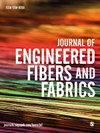Research on manufacturing of three component composite fiber with complex cross-section pattern
IF 2.3
4区 工程技术
Q1 MATERIALS SCIENCE, TEXTILES
引用次数: 0
Abstract
In this work, a preparation method of three-component composite fibers with complex cross-sectional patterns is proposed, and the fibers with complex cross-sectional patterns are fabricated using melt spinning. Initially, inspired by the shape of a fishbone, a spinning pack with three-component melt channels is designed for spinning fibers with a fishbone cross-sectional pattern. Then, the numerical simulation of the melt flow in the channels of the spinning pack is performed using Polyflow software. The spinning pack structure is optimized by analyzing the flow velocity distribution and shear rate distribution of different components within the spinning pack channels. The results show that smaller velocity fluctuations contribute to the clarity of the cross-sectional pattern. Thereafter, the spinning experiments are carried out based on the optimized spinning pack. The effect of the flow ratio between the three components on the cross-sectional pattern is discussed, and the three-component composite fibers with a clear fishbone cross-sectional pattern is obtained. Finally, in order to further study the effectiveness of the complex cross-sectional pattern fiber preparation proposed in this paper, another spinning pack for fibers with an H-shaped cross-sectional pattern is designed according to the aforementioned method, and spinning experiments are carried out. The SEM images of the cross-sections of fibers with fishbone and H-shaped cross-sectional patterns are obtained, verifying the feasibility of the method proposed in this paper. Moreover, the fibers with complex cross-sectional patterns obtained by this method have a certain anti-counterfeiting effect and can also be blended with other yarns to obtain fabrics with anti-counterfeiting effects.复杂截面三元复合纤维的制备研究
本文提出了一种具有复杂截面图案的三组分复合纤维的制备方法,并采用熔融纺丝法制备了具有复杂截面形状的纤维。最初,受鱼骨形状的启发,设计了一种具有三组分熔体通道的纺丝包,用于纺丝具有鱼骨横截面图案的纤维。然后,使用Polyflow软件对纺丝包通道中的熔体流动进行了数值模拟。通过分析不同组分在纺丝包通道内的流速分布和剪切速率分布,优化了纺丝包结构。结果表明,较小的速度波动有助于截面图案的清晰度。然后,在优化后的纺丝组件的基础上进行纺丝实验。讨论了三组分流量比对截面形态的影响,得到了具有清晰鱼骨截面形态的三组分复合纤维。最后,为了进一步研究本文提出的复杂截面图案纤维制备的有效性,根据上述方法设计了另一种用于H形截面图案纤维的纺丝包,并进行了纺丝实验。获得了具有鱼骨和H形截面图案的纤维截面的SEM图像,验证了本文提出的方法的可行性。此外,通过这种方法获得的截面图案复杂的纤维具有一定的防伪效果,也可以与其他纱线混纺,获得具有防伪效果的织物。
本文章由计算机程序翻译,如有差异,请以英文原文为准。
求助全文
约1分钟内获得全文
求助全文
来源期刊

Journal of Engineered Fibers and Fabrics
工程技术-材料科学:纺织
CiteScore
5.00
自引率
6.90%
发文量
41
审稿时长
4 months
期刊介绍:
Journal of Engineered Fibers and Fabrics is a peer-reviewed, open access journal which aims to facilitate the rapid and wide dissemination of research in the engineering of textiles, clothing and fiber based structures.
 求助内容:
求助内容: 应助结果提醒方式:
应助结果提醒方式:


